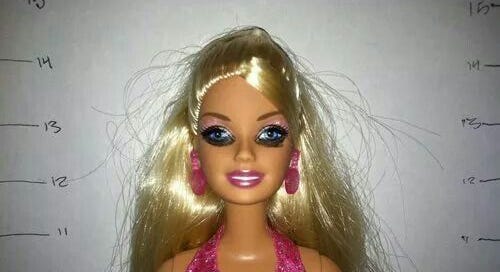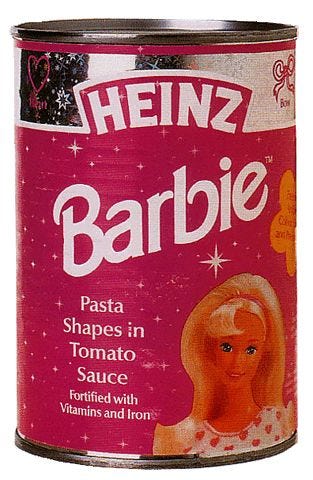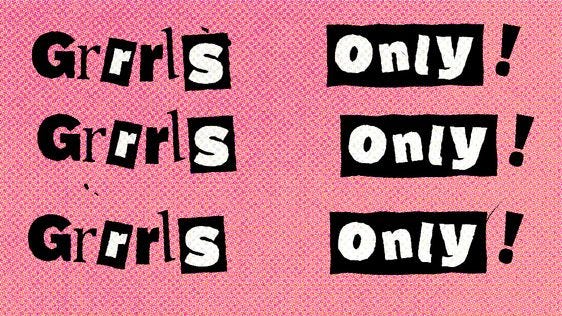Making sense of Barbiemania
A vehicle for meaningful political message, or a morass of hot pink contradictions?
You’re reading Wait, Really? — a newsletter unpacking what's in the culture, with a feminist spin. Want to get it in your inbox? Sign up below.
I saw Barbie twice last week. First, on opening day, at the opening showing, at my local theater; then again in Northampton, Mass., with the best person I could think of to help me sort through my complicated thoughts on it: Susan Faludi.
Faludi is the Pulitzer-winning journalist and author, whose 1991 book, “Backlash,” became an instant feminist classic. Last year, in the wake of the Supreme Court decision to overturn Roe v. Wade, she wrote an essay bemoaning how feminists had made a Faustian bargain with popular culture. While we’d been wearing “Smash the patriarchy” T-shirts and leaning in at work to the tune of “Who run the world? (Girls),” she argued, Donald Trump had been packing the Supreme Court and gutting the Equal Employment Opportunity Commission. Feminism had become cool, fun — and in the process had taken its eyes off the ball.
This seemed to make her an ideal viewing companion for this summer’s most joyful and lucrative blockbuster — albeit one that seemed the perfect distillation of these tensions. Could a movie currently fueling Barbiecore across America actually be a vehicle for a meaningful political message? Or was it simply a morass of hot pink contradictions?
There are few toys quite so confounding as Barbie. Even her origin story: She was based on a sex doll for men, but somehow marketed to mothers for their daughters. Barbie has been a protest slogan (“I am not your Barbie”), a bimbo (remember “Math class is tough” Barbie?), an eating disorder accelerant — “everything we didn’t want to be and were told to be,” as Gloria Steinem once put it. Barbie has been decapitated and melted and had her hair chopped off, and in one particularly clever protest, had her voice box swapped with G.I. Joe’s (so suddenly she said, “Vengeance is mine!” and he said, “The beach is the place for summer!”).
But Barbie has also been a lawyer, a pilot, an astronaut and the president. She has never married, lives alone and does not have children.

The movie seemed as full of contradictions as the doll. It was promoted through a marketing campaign that had more licensing deals than Barbie has outfits: There were Barbie clothes and Barbie makeup and ice cream and vacation packages and a takeover of the Google home page, which is currently filling my screen with pink explosions every time I try to fact-check this essay.
But it also had a director — Greta Gerwig — with indie street cred, and early reviews focused on the film’s subversiveness. Gerwig, it seemed, had managed to make Barbie satisfyingly self-aware, likable and mockable; she called out the hypocrisy of the manufacturer — Mattel — while getting its blessing on the project. And then, somehow, she — and the company — marketed it all back to us.
“This sounds like a kick!” Faludi said, when I suggested we might watch the movie together. She suggested we show up in a pink Corvette, but unfortunately the only vehicle available was a 2002 Toyota Tacoma (which I promptly backed into a parked car). So this was how one of the world’s leading feminists and I showed up to the local mall, with tickets to Auditorium 2: Barbie.
You can read my column in The Times here.
Meanwhile… what to make of girlie-core
Speaking of “Backlash”… there’s a section in that book where Faludi writes about the perils of the journalistic trend story, a thing I know a thing or two about.
Faludi explains how the (poorly) executed trend story, while claiming to identify sweeping shifts in social behavior, often provides little evidence. But once one outlet runs the story, others scramble to catch up — and thus begins the power of repetition.
I was reminded of that passage because of a story I can’t seem to get away from — that of the “Lazy girl job.”
Heard of it?
According to the Wall Street Journal, and at least 10,900 results on Google News since that article was published, the lazygirl job is one that can be done from home, comes with a “chill” boss, and ends early. It’s a rejection of hustle culture, a cousin to quiet quitting, and it leaves time for the important stuff… like doomscrolling, bedrotting, and existential dread. Its name emerged, naturally, on TikTok.
But it’s not actually the merits of the lazy job I am intrigued by — it’s the name. Is a lazygirl job just a job that men have done forever, without the title? If I don’t want to be a girlboss, but I also don’t want to be a girlfailure, am I destined to be a lazygirl?And as a lazy girl, must I eat only girl dinners (it’s like charcuterie, but girlie!), go on hot girl walks (like regular walks, but without the men), and dress in girlie-core during his extremely hot, hot girl summer?
Anyway, you see what I’m getting at, and I’m not quite sure what to make of it — but I’d love to know what you do.
Until then, I’ll be over here having girl thoughts.







Bedrotting sounds suspiciously like depression. Thanks for sending me down the rabbit-hole Jessica!
Ugh, and why must we endorse the infantilization inflicted upon us by everything being "girlsomething"? Or maybe I've just instantaneously become a bitter 43 yo by acknowledging that I am, in fact, a grown woman? Thank you for your article, I really appreciate it!